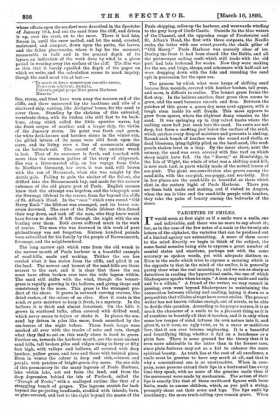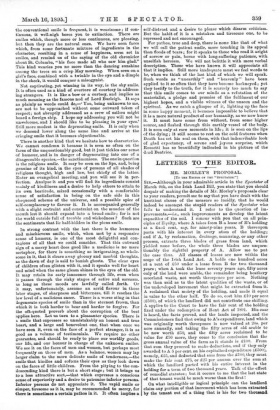VARIETIES IN SMILES.
IT would seem at first sight as if a smile were a smile, one and indivisible, and there was no more to say about it ; but, as in the case of the few notes of a scale or the twenty-six letters of the alphabet, the varieties that can be produced out of a limited agency are astonishing. A score of them occur to the mind directly we begin to think of the subject, the same facial muscles being able to express a great number of mental states and emotions, perhaps not with the same accuracy as spoken words, yet with adequate distincn Es. Even in the smile which tries to express a meaning which is the opposite to that in the mind of the smiler, it is generally pretty clear what the real meaning is ; and we are as sharp as detectives in reading the hypocritical smile, the one of which Shakespeare speaks when he says," A man may smile and smile and be a villain." A friend of the writer, we may remark in passing, even went beyond Shakespeare in maintaining the connection between villainy and smiling, laying it down as a proposition that villains always have sweet smiles. The present writer has not known villains enough, out of novels, to be able to decide this question. According to its proper nature, it is as much the character of a smile to be a pleasant thing as it is of sunshine to beautify all that it touches, and it is only when some low temper of mind infuses its own nature into it, and gives it, as it were, an ugly twist, as in a sneer or malicious. leer, that it can ever become unpleasing. It is a beautiful- and beautifying thing, whether it fall on a handsome or a plain face. There is some ground for the theory that it is even more admirable in the latter than in the former case, since plain features may act as a foil to enhance the more spiritual beauty. As truth lies at the root of all excellence, a smile must be genuine to have any merit at all, and that is why a conventional one is so unattractive. When in com- pany, some persons extend their lips in a horizontal line every time they speak, with no more of the genuine smile than if the movement were made by mechanism. The action of their lips is exactly like that of those cardboard figures with loose limbs, made to amuse children, which, as you pull a string,. promptly shoot out their arms and legs. The lips smile by machinery; the more truth-telling eyes remain grave. When
the conventional smile is frequent, it is wearisome ; if con- tinuous, it well-nigh bores you to extinction. There are smiles which, though more or lees continuous, are pleasing, but then they are the natural ones. We have seen faces which, from some fortunate mixture of ingredients in the character, resulting in a sense of happiness, seem set in smiles, and remind us of the saying of the old chronicler about St. Columba, "his face made all who saw him glad."
This kind wearies you no more than the dancing sunshine among the trees on a crisp May morning. When seen on a girl's face, combined with a twinkle in the eye and a dimple in the cheek, it would conquer a misogynist.
Not captivating, yet winning in its way, is the shy smile. It is often used as a kind of overture of courtesy in address- ing strangers. It is like a bow or a curtsey, and implies as much meaning as the famous nod of Lord Burleigh. It says as plainly as words could 41o,—' You, being unknown to me, are not to be approached without some outward token of respect; not abruptly addressed as a crew of sailors might board a foreign ship. I hope my addressing you will not be unwelcome, and I should like to be pleasing in your eyes.' Still more modest is the deprecating smile. It is only when we descend lower along the same line and arrive at the cringing smile that it becomes objectionable.
There is another kind that we hesitate how to characterise. We cannot condemn it because it is seen so often on the -faces of the unquestionably good, but it just tickles our sense of humour, and is in danger of degenerating into one of a disagreeable species,—the sanctimonious. The one in question is the religions smile. It may be seen on the lips, and, being genuine of its kind, in the eyes of persons of all shades of religious thought, high and low, but chiefly of the latter. Enter an evangelical meeting, and you will see it in per- fection. Analyse it and you will find its ingredients consist mainly of kindliness and a desire to help others to attain to its own beatitude, mixed occasionally with a comfortable sense of satisfaction in being on the safe side in this chequered scheme of the universe, and a possible spice of self-complacency to flavour it. It is accompanied generally with a slight restraint and constraint on the muscles of the mouth lest it should expand into a broad smile; for is not the world outside full of trouble and wickedness ? Such are the sentiments that lie half-hidden in the pious smile.
In strong contrast with the last there is the humorous and mischievous smile, which, when met by a responsive sense of humour, is one of the most delightful and con- tagious of all that we could consider. That this outward sign of a merry heart does good like a medicine is no mere metaphor, for there is something so invigorating, so whole- some in it, that it clears away gloomy and morbid thoughts, as the dawn of day is said to banish ghosts. The clear eyes of children often glisten with it, and it speaks well for heart and mind when the same gleam shines in the eyes of the old. It may retain its early innocence through life, even when it passes through the risky stages of satire and sarcasm, as long as these moods are lawfully called .forth. Or it may, unfortunately, assume an acrid flavour in these later stages, of sharpness and bitterness, till it reaches the low level of a malicious sneer. There is a worse sting in that degenerate species of smile than in the sternest frown, than which it is both harder to bear and harder to forgive. For the oft-quoted proverb about the corruption of the best applies here. Let us turn to a pleasanter epecies. There is a smile that expresses so unmistakably an honest and true heart, and a large and benevolent one, that when once we have seen it, even on the face of a perfect stranger, it is as good as a volume of testimonials We require no other guarantee, and should be ready to place our worldly goods, our life, and our honour in charge of the unknown smiler. We see it on the faces of men and women, but perhaps most frequently on those of men. As a balance, women may lay larger claim to the more delicate smile of tenderness,—the smile that kindles and softens their eyes as they look down on the faces of little children. From the pitying to the con- descending kind there is but a short stage; but it brings us to 0. less attractive sort,—that which expresses a conscious sense of superiority and a desire to patronise inferior persons. Inferior persons do not appreciate it. The vapid smile or simper, tiresome as it is, may be recommended to mercy, for there is sometimes a certain pathos in it. It often implies a self-distrust and a desire to please which disarm criticism. But the habit of it is a mistaken and tiresome one, to be repressed and not encouraged.
For pathos, tree and deep, there is none like that of what we will call the patient smile, more touching in its appeal than floods of tears ; for it speaks to those who read it aright of sorrow or pain, borne with long-suffering patience, with unselfish heroism. We will not belittle it with mere verbal description. Those who have known it will appreciate all that it implies. Still more inadequate must we feel words to be, when we think of the last kind of which we will speak. Such words as "unearthly" and "heavenly" have been applied to it so often that they have become hackneyed ; yet they testify to the truth, for it is scarcely too much to say that this smile comes to our minds as a refutation of the materialist, a pledge and promise of the fulfilment of our highest hopes, and a visible witness of the unseen and the spiritual. As we catch a glimpse of it, lighting up the face in some happy moment, it becomes impossible to believe that it is a mere natural product of our humanity, as we now know it. It must have come from without, from some higher source, and flashed through this earthly vessel of the body. It is seen only at rare moments in life ; it is seen on the lips of the dying; it still seems to rest on the cold features when Death has set his seal on them, with that indescribable look of glad expectancy, of serene and joyous surprise, which Rossetti has so beautifully indicated in his picture of the dead Beatrice.



































 Previous page
Previous page